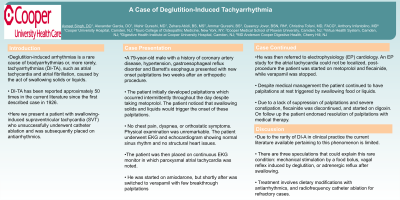Sunday Poster Session
Category: Esophagus
P0567 - A Case of Deglutition-Induced Tachyarrhythmia
Sunday, October 27, 2024
3:30 PM - 7:00 PM ET
Location: Exhibit Hall E

Has Audio

Avneet Singh, DO
Cooper University Hospital
Camden, NJ
Presenting Author(s)
Avneet Singh, DO1, Alexander Garcia, DO1, Mahir Qureshi, MD1, Zehara Abidi, BS, MS2, Ammar Qureshi, BS3, Queenzy Jover, BSN, RN4, Christina Tofani, MD, FACG5, Anthony Infantolino, MD6
1Cooper University Hospital, Camden, NJ; 2Touro College of Osteopathic Medicine, New York, NY; 3Cooper Medical School of Rowan University, Camden, NJ; 4Virtua Health System, Camden, NJ; 5Digestive Health Institute at Cooper University Hospital, Camden, NJ; 6MD Anderson Cooper Digestive Health, Cherry Hill, NJ
Introduction: Deglutition-induced arrhythmias is a rare cause of bradyarrhythmias or, more rarely, tachyarrhythmias (DI-TA), such as atrial tachycardia and atrial fibrillation, caused by the act of swallowing solids or liquids. DI-TA has been reported approximately 50 times in the current literature since the first described case in 1926. Here we present a patient with swallowing-induced supraventricular tachycardia (SVT) who unsuccessfully underwent catheter ablation and was subsequently placed on antiarrhythmics.
Case Description/Methods: A 79-year-old male with a history of coronary artery disease, hypertension, gastroesophageal reflux disorder and Barrett's esophagus presented with new onset palpitations two weeks after an orthopedic procedure. The patient initially developed palpitations which occurred intermittently throughout the day despite taking metoprolol. The patient noticed that swallowing solids and liquids would trigger the onset of these palpitations. No chest pain, dyspnea, or orthostatic symptoms. Physical examination was unremarkable. The patient underwent EKG and echocardiogram showing normal sinus rhythm and no structural heart issues. The patient was then placed on continuous EKG monitor in which paroxysmal atrial tachycardia was noted. He was started on amiodarone, but shortly after was switched to verapamil with few breakthrough palpitations. He was then referred to electrophysiology (EP) cardiology. An EP study for the atrial tachycardia could not be localized, post-procedure the patient was started on metoprolol and flecainide, while verapamil was stopped. Despite medical management the patient continued to have palpitations at rest triggered by swallowing food or liquids. Due to a lack of suppression of palpitations and severe constipation, flecainide was discontinued, and started on digoxin. On follow up the patient endorsed resolution of palpitations with medical therapy.
Discussion: Due to the rarity of DI-A in clinical practice the current literature available pertaining to this phenomenon is limited. There are three speculations that could explain this rare condition: mechanical stimulation by a food bolus, vagal reflex induced by deglutition, or adrenergic reflux after swallowing. Treatment involves dietary modifications with antiarrhythmics, and radiofrequency catheter ablation for refractory cases.
Disclosures:
Avneet Singh, DO1, Alexander Garcia, DO1, Mahir Qureshi, MD1, Zehara Abidi, BS, MS2, Ammar Qureshi, BS3, Queenzy Jover, BSN, RN4, Christina Tofani, MD, FACG5, Anthony Infantolino, MD6. P0567 - A Case of Deglutition-Induced Tachyarrhythmia, ACG 2024 Annual Scientific Meeting Abstracts. Philadelphia, PA: American College of Gastroenterology.
1Cooper University Hospital, Camden, NJ; 2Touro College of Osteopathic Medicine, New York, NY; 3Cooper Medical School of Rowan University, Camden, NJ; 4Virtua Health System, Camden, NJ; 5Digestive Health Institute at Cooper University Hospital, Camden, NJ; 6MD Anderson Cooper Digestive Health, Cherry Hill, NJ
Introduction: Deglutition-induced arrhythmias is a rare cause of bradyarrhythmias or, more rarely, tachyarrhythmias (DI-TA), such as atrial tachycardia and atrial fibrillation, caused by the act of swallowing solids or liquids. DI-TA has been reported approximately 50 times in the current literature since the first described case in 1926. Here we present a patient with swallowing-induced supraventricular tachycardia (SVT) who unsuccessfully underwent catheter ablation and was subsequently placed on antiarrhythmics.
Case Description/Methods: A 79-year-old male with a history of coronary artery disease, hypertension, gastroesophageal reflux disorder and Barrett's esophagus presented with new onset palpitations two weeks after an orthopedic procedure. The patient initially developed palpitations which occurred intermittently throughout the day despite taking metoprolol. The patient noticed that swallowing solids and liquids would trigger the onset of these palpitations. No chest pain, dyspnea, or orthostatic symptoms. Physical examination was unremarkable. The patient underwent EKG and echocardiogram showing normal sinus rhythm and no structural heart issues. The patient was then placed on continuous EKG monitor in which paroxysmal atrial tachycardia was noted. He was started on amiodarone, but shortly after was switched to verapamil with few breakthrough palpitations. He was then referred to electrophysiology (EP) cardiology. An EP study for the atrial tachycardia could not be localized, post-procedure the patient was started on metoprolol and flecainide, while verapamil was stopped. Despite medical management the patient continued to have palpitations at rest triggered by swallowing food or liquids. Due to a lack of suppression of palpitations and severe constipation, flecainide was discontinued, and started on digoxin. On follow up the patient endorsed resolution of palpitations with medical therapy.
Discussion: Due to the rarity of DI-A in clinical practice the current literature available pertaining to this phenomenon is limited. There are three speculations that could explain this rare condition: mechanical stimulation by a food bolus, vagal reflex induced by deglutition, or adrenergic reflux after swallowing. Treatment involves dietary modifications with antiarrhythmics, and radiofrequency catheter ablation for refractory cases.
Disclosures:
Avneet Singh indicated no relevant financial relationships.
Alexander Garcia indicated no relevant financial relationships.
Mahir Qureshi indicated no relevant financial relationships.
Zehara Abidi indicated no relevant financial relationships.
Ammar Qureshi indicated no relevant financial relationships.
Queenzy Jover indicated no relevant financial relationships.
Christina Tofani indicated no relevant financial relationships.
Anthony Infantolino indicated no relevant financial relationships.
Avneet Singh, DO1, Alexander Garcia, DO1, Mahir Qureshi, MD1, Zehara Abidi, BS, MS2, Ammar Qureshi, BS3, Queenzy Jover, BSN, RN4, Christina Tofani, MD, FACG5, Anthony Infantolino, MD6. P0567 - A Case of Deglutition-Induced Tachyarrhythmia, ACG 2024 Annual Scientific Meeting Abstracts. Philadelphia, PA: American College of Gastroenterology.
